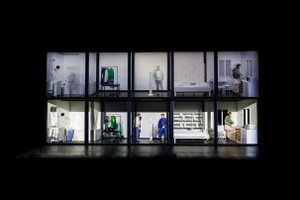Infotreffen - Verbrennungen
In the organizer's words:
They simply have to exist, these other stories that make us believe in peace - thoughts from author Wajdi Mouawad and director Bassam Ghazi in response to questions from dramaturge Birgit Lengers
Author Wajdi Mouawad and director Bassam Ghazi share existential experiences, but they have never met. Both have spoken about their life themes: the power of art, origins and exile.
You were both born in Lebanon and were forced to leave your home country during your childhood as a result of the civil war. When was your first encounter with art?
Wajdi Mouawad - My relationship with writing began in adolescence, around the age of 15, when I wrote my first texts. But the roots go back much further. I used to draw and paint a lot in Lebanon. I only started talking when I was seven. Drawing and painting were a way of expressing myself without having to speak. It was in the small apartment I lived in in France - my first host country from 1978 to 1983 - that I switched to literature.
Bassam Ghazi - I first came into contact with art on the other side of the world. Somewhere in Bolivia, 25 years ago, I discovered a theater project with street children. These young people found a way to share their stories through theater. It was there that I first experienced art as a free space that enables sincere encounters and visionary exchange. I learned there that art has a lot to do with attention. An attention that we humans unfortunately give ourselves too rarely. Fortunately, in the theater there is a commitment to attention.
What role do theater and literature play in your life today?
Bassam Ghazi - I am tirelessly searching for stories that give us hope, comfort and encouragement. I need them for my resilience in this world full of agitation, hatred and never-ending wars. They help me not to give up, not to despair. They simply have to exist, these other stories that make us believe in peace again.
Wajdi Mouawad - I think all day about what I could write. There is nothing else that interests me. Even when I sleep, I think about it. I don't know if I'm doing it well, but I also don't know how I could do anything else.
To what extent do your origins and experience of exile influence your artistic work?
Bassam Ghazi - I am always faced with the question: What came first, me or my story? The civil war in Lebanon began shortly after I was born in Tel al-Zaatar. When I was just six months old, my parents fled with me from Lebanon to Germany. My mother's side of the family went into exile in Canada. From the age of nine to twelve, I lived in Beirut again for three years and experienced the war first-hand. I commute between cultures and perspectives and trade in history and stories in my theater work. I am always looking for a connection between individual and collective history.
Wajdi Mouawad - I studied Shakespeare and Chekhov, but they weren't my stories. So I decided to write a story that was not only mine, but that of thousands of other Lebanese. I decided to tell the story of a boy in exile.
In 2003, I wrote "Burnings", a drama that artistically explores the themes of identity and memory, violence and family secrets. The play tells the story of twins Jeanne and Simon, who are given a mission in the will of their recently deceased mother: They are to find their brother and their father. They embark on a journey to the Middle East, where they are confronted with their mother's past. What is the motivation behind bringing the play to the stage now?
Bassam Ghazi - "Burns" means a lot to me. The play is part of my story, and staging it now is my attempt to find an expression for this incredible violence in Lebanon, which has been with me since I was born. For fucking 50 years! How are the players and the audience taken on this personal journey?
Bassam Ghazi - I tend to ask myself how the stories of the ensemble can be connected to the dramatic text. For me, it's about authenticating the story through the representation of the people involved on stage.
What effect of your art do you believe in or hope for?
Wajdi Mouawad - I was a victim of the war for four years, then I went into exile. I witnessed the silence of my parents and adults in general. I saw what the war did to them. I experienced political silence. The kind of reappraisal that took place in post-war Germany never happened in Lebanon. For me, writing is not just a cultural act. There is something else behind it. We have to tell our story, it is also an act of recognition and appreciation. The power of literature lies not only in the power of words, but also in the power of imagination. It is the imaginary that creates distance and liberates the audience. In short, art offers a therapeutic outlet that I would describe as catharsis.
Bassam Ghazi - I also experience this incredible freedom in the protected setting of the theater. But there are always painful moments when we have to comfort each other in the face of the incomprehensible brutality of this world. Out of this pain grows a strength to work through reality and share comfort and hope with the audience.
What is the relationship between art and reality?
Wajdi Mouawad - Literature is a way of describing the unimaginable, a way of touching the truth. In this quest for the true, science and literature perhaps come together: Both try - each in its own way - to reach the moment in which we are beyond reality and which is therefore truer than reality itself.
Bassam Ghazi - Theater is relationship work to create trust in each other and in oneself. The team embarks on a collective journey in which no one knows exactly where we will end up. That is the utopian moment. I believe that the power of theater - this shared appointment for a specific time in a shared space - comforts and heals. Theater can encourage people to step into their own abysses, to break the silence and to experience this speaking as an act of liberation.
Bassam Ghazi is a director and ran the Stadt:Kollektiv together with Birgit Lengers from 2021 to 2024. Born in Lebanon in 1974, he has a special interest in intercultural and post-migrant theater. In addition to "Dschinns" by Fatma Aydemir and "Solingen 1993" (awarded the German Theater Prize Der Faust), he most recently directed "Romeo and Juliet" based on William Shakespeare at D'haus.
Location
Location | Theater

Location | Theater















